Barbara Bush and Her 'Nemesis' Nancy Reagan: The Real Story About Their Difficult Relationship

For all that history tried to tie Barbara Bush and Nancy Reagan together — both were born in New York City, both attended Smith College, both were first ladies and were even very distant cousins — they were never, ever close.
By most accounts their relationship was, at best, cordial, with each subsuming any animosity into the greater goal of the success of their husbands, Presidents Ronald Reagan and George H. W. Bush.
But at their relationship’s lowest point, as during their final substantial conversation, in 1993, the feelings between Mrs. Bush and Reagan could “erupt.”
Their disdain, long chronicled in books and news articles, is back in the spotlight with a candid biography of Mrs. Bush, Susan Page’s The Matriarch.
Page wrote that their fateful phone call 26 years ago began with Mrs. Reagan trying repeatedly to reach her successor in late January of that year. President Bush and his wife had just left the White House for Texas following the inauguration of President Bill Clinton, who had defeated Bush in his bid for re-election.
That difficult period was made more trying, for the Bushes, by the bizarre experience of reading in the New York Times about Mrs. Reagan calling into ABC News — during their inaugural broadcast — to refute reporting about her treatment of them, according to Page.
The Matriarch, published earlier this week, recounts what happened next: “The Bushes were aghast. At the low point of their political lives, Nancy Reagan had made one more petty dig.”
Clinton had been sworn in on Jan. 20, 1993, with the Times column about Mrs. Reagan’s comments coming out the following day. She tried to call Mrs. Bush on Jan. 22, Page wrote, but Mrs. Bush “made herself unavailable.”
When Mrs. Reagan called again the following day, Mrs. Bush “reluctantly” took her call.
It did not go well.
“She [Mrs. Reagan] started out by saying that she knew that this was a hard time with packing boxes and all … but … and here I interrupted her and said that all was well,” Mrs. Bush remembered, according to Page. “I told her that our friends and family had given us such a good welcome home and that they had pretty much unpacked for us, [but] that the thing that made it tough was having her say all those ugly things about me on the air.”
“She said that she was just trying to explain,” Mrs. Bush continued. “I asked her not to explain about me anymore.”
Mrs. Bush concocted a story about badgering reporters who had come to her door “yelling questions” about what Mrs. Reagan had said, Page wrote.
Mrs. Bush told Mrs. Reagan that “she had hurt me badly and I just could not understand it.”
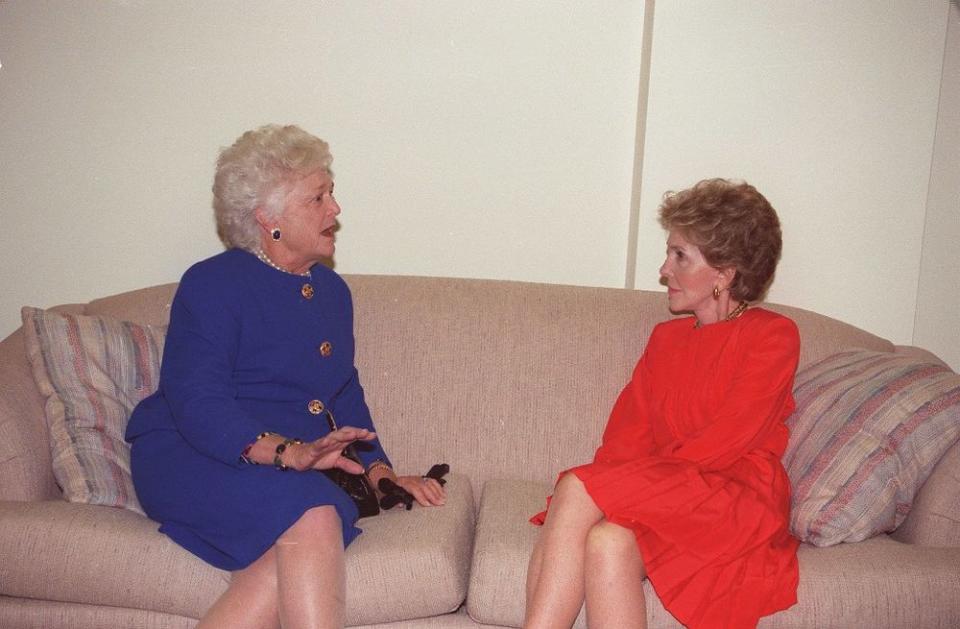
According to the Times write-up of Mrs. Reagan’s impromptu appearance on ABC News, she “had been desperately trying to call Barbara Walters, an old friend, to privately correct something Ms. Walters had said on the air. … But somehow, Mrs. Reagan was connected to Peter Jennings on the air.”
The Times column continued, “While Mr. Jennings and David Brinkley sat by, bemused, Mrs. Reagan unloaded on both her successors.”
Referring to the Bushes, Mrs. Reagan “insisted that, no matter what Barbara Bush said, she had given Mrs. Bush a full tour of the White House. … And she complained bitterly that the Bushes had never invited the Reagans back for a state dinner.”
Two days later, on the phone with Mrs. Reagan, Mrs. Bush corrected her memory, Page wrote in The Matriarch:
“Barbara reminded Nancy they had invited the Reagans to the White House just [10] days earlier, to present the Medal of Freedom to the former president.”
Mrs. Bush was more emphatic in her own words, recalling in an interview with Page that she told Mrs. Reagan: “We did have your wonderful husband to the White House, and don’t you ever call me again!”
Then Mrs. Bush said she had to take another call and hung up.
It was, Page wrote, a moment when “the grievances of a decade, submerged for so long, finally erupted.”
As Mrs. Bush wrote in her diary at the time, which she later shared with Page: “I had said nothing and since I don’t do that and since she had not thanked us for the reception, I just didn’t feel like playing her game any more!!!”
Months and months later, Mrs. Bush wrote, “I have not talked to her [Mrs. Reagan] since, but I certainly felt better,” according to Page.
Mrs. Reagan never called her again.
It was a rare blowup in a perpetually cool relationship, one more often governed by an unspoken power imbalance — Mrs. Reagan largely in the limelight — and, just as likely, all kinds of implicit assumptions each made about the other.
Carl Anthony, a historian of first ladies, wrote last April that “the friction between them is difficult to specifically pinpoint. It may have been rooted in not only essentially different political philosophies but personal insecurities.”
For all they drove each other apart, however, Mrs. Bush and Mrs. Reagan had some things in common.
As one former employee of both couples told the Times in 2004: “What I’ve found is that the wives of political people have long memories. They tend not to forget.”
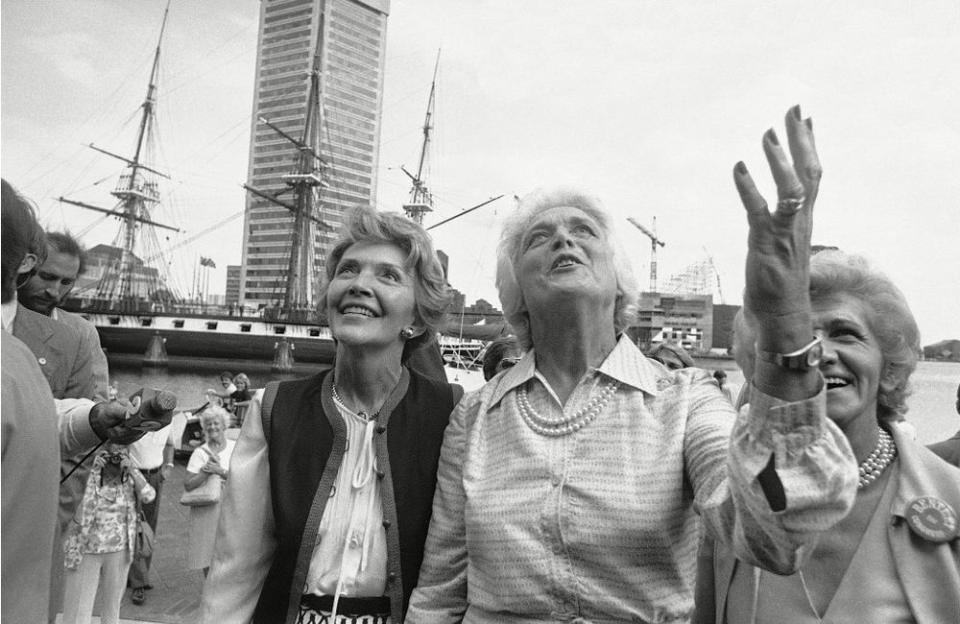
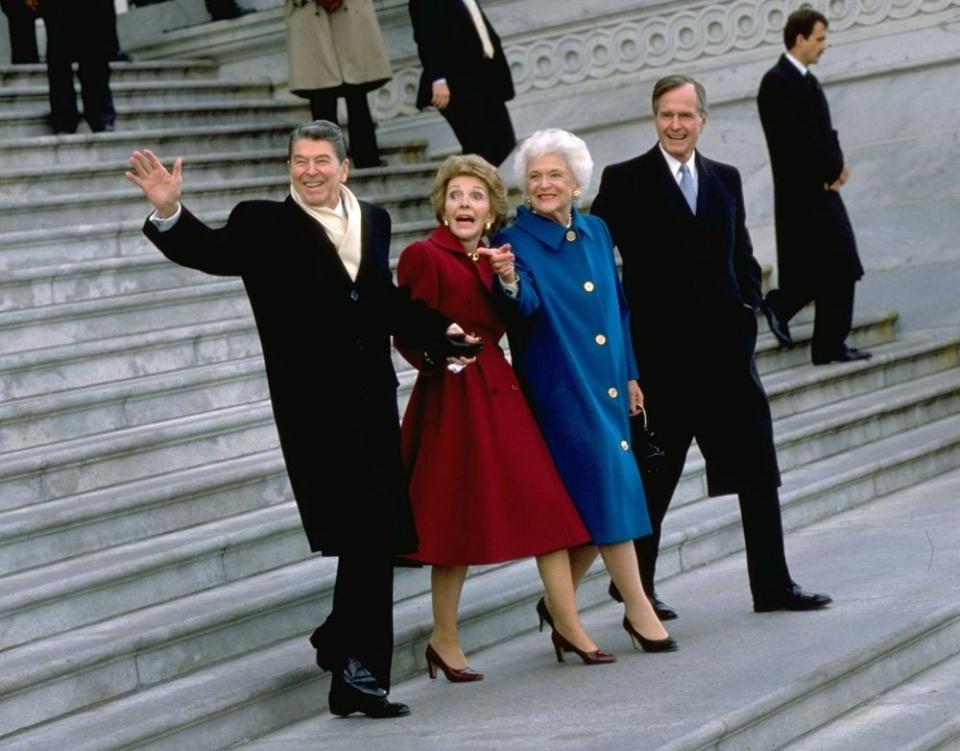
A Brief History of Years of Bad Blood
Page’s biography explores the permanent “frost” between the two first ladies in detail, tracing back to a time when they actually seemed to like each other. But Page is hardly the first to look at what soured their relationship — and kept it that way.
Mrs. Bush was asked about it almost as soon as her husband was first named President Reagan’s running mate, in 1980.
“We’ve only met twice. And from what I’ve seen of Nancy so far, I like her and she likes me,” Mrs. Bush told one reporter. “Furthermore, I think she’s ravishingly beautiful. When we were with them, I could hardly take my eyes off her … and she’s been just darling to us. If anything, I think she’s just shy.”
According to a PEOPLE report from that same time, Mrs. Bush said she and Mrs. Reagan had discussed talk of their mutual disdain: “I said, ‘I know you don’t hate me, and I don’t hate you. I hope you don’t believe those terrible rumors.’ “
Page wrote that the two women first met “pleasantly enough” at the 1968 Republican National Convention.
Mrs. Bush had gone over to introduce herself, later telling a cousin in a letter that “I found them both very attractive.” Of Mrs. Reagan, she wrote, “She is tiny and really a very lovely natural beauty.”
Bush had recently won a House seat in Texas and was later named the ambassador to the United Nations, then the Republican National Committee chair, then the top U.S. diplomat in China and then the CIA director.
The same year that Bush became a Texas representative, Reagan was sworn in as the California governor.
The two couples were not strangers — according to Page, they met again for President Richard Nixon’s second inauguration, in 1973. But they became rivals in the lead up to the 1980 presidential election, as Bush unsuccessfully challenged Reagan for the Republican nomination.
RELATED: Ex Bush Daughter-in-Law Speaks out Unprompted on New Barbara Biography — ‘Very Ironic’
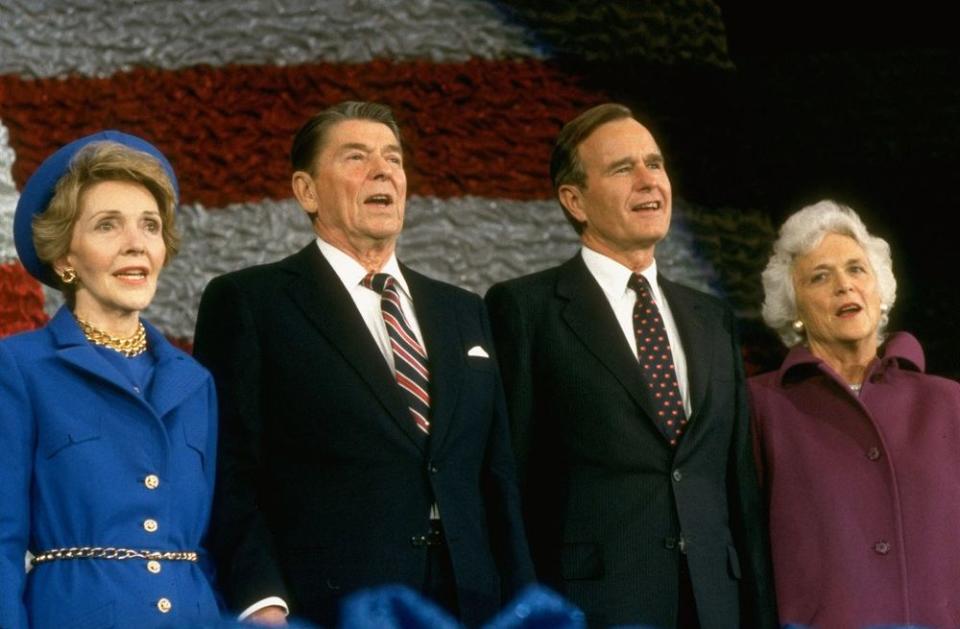
Bush ridiculed Reagan’s “voodoo economics” and supporters argued Reagan was too old and inexperienced for the job. The Reagan camp was disdainful that Bush held on so long in the primary, after it was clear that voters had not chosen him.
Reagan “reluctantly” offered Bush the spot as his running mate, overcoming any umbrage from the campaign trail, only after his first choice, President Gerald Ford, had proved unworkable, Page wrote.
Mrs. Reagan, however, “was unpersuaded. Like Barbara Bush, she was fiercely protective of her husband, and more likely than he was to carry a grudge.”
A review of Page’s book as well as previous accounts and news reports through the years shows a host of slights — of various sizes; perceived, implicit, obvious or otherwise — committed by both women once they were yoked together by their husbands’ partnerships.
“Bush and Reagan had a very amiable relationship, and he had access to anything Reagan had,” a former Reagan adviser told the Times in 2004.
But, Page wrote, to Mrs. Bush, Mrs. Reagan “became a nemesis.”
“She really hated us,” Mrs. Bush told Page. “I don’t know why, but she really hated us.”
Things were less than sunny from the start, according to Page: The Bushes went to the Reagans’ hotel for breakfast after the ticket was announced, but Mrs. Reagan “lingered in the bedroom before making an entrance.”
During their years in the White House, “the Reagans invited the Bushes upstairs to the private family quarters of the White House only a time or two before Bush had been elected to the presidency himself,” Page wrote.
At one point during Reagan’s presidency, Mrs. Reagan conveyed through intermediaries that the Bushes should make fewer headlines, according to Page. She had a mocking nickname for the second couple: “the Shrubs.”
“That wasn’t very nice,” Mrs. Bush told Page of Mrs. Reagan’s message. “I didn’t get into the news, but it was George, I think, she didn’t want to get into the news.”
In another flap, according to Page, Mrs. Bush was told not to wear red to Reagan’s inauguration, instead opting for blue — a hue that, as historian Anthony noted last year, came to define her.
In yet another example, Page wrote, the White House once shot down a suggestion that Mrs. Bush escort Raisa Gorbachev, the wife of the leader of the Soviet Union, on an outing while the Gorbachevs were in Washington, D.C.
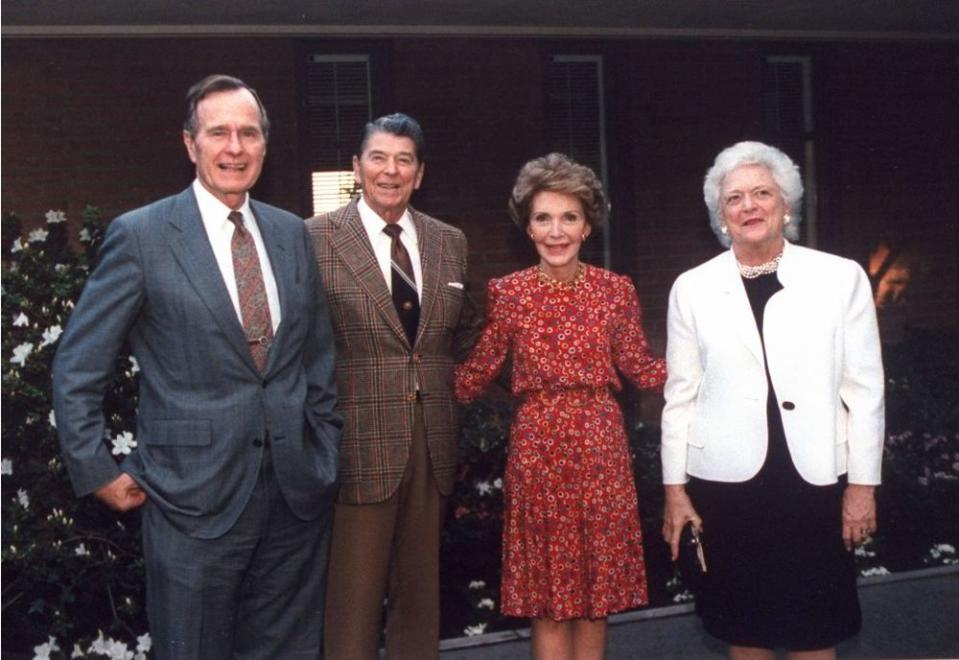
Mrs. Bush was not above engaging in her own way: Citing former White House reporter Lou Cannon, Page wrote that she was chatting with some reporters during a vice presidential trip in 1986 when she “did some imitations of Nancy that were funny,” according to Cannon. “But they were also cutting.”
“It was like watching a person saying things they shouldn’t say,” Cannon said. Mrs. Reagan later asked Cannon about that plane trip: “She knew damn well what happened on that plane,” he said.
Mrs. Bush told Page that she “tried very, very hard, truthfully,” in the face of Mrs. Reagan’s hostility.
Page wrote that while protocol dictated the Bushes be invited to state dinners, it seems that was all Mrs. Reagan would allow them and “they never invited the Bushes to accompany them to Camp David.”
And then there was the Nov. 9, 1985, dinner for Princess Diana and her husband — “one of the most sought-after invitations of Reagan’s presidency,” according to Page.
Citing documents from the Reagan Library archives, Page wrote that the names of the Bushes, then vice president and second lady, were crossed out by hand from both an initial invite list and an accompanying plan for them to “greet guests in the Red Room.”
The Bushes appeared only under a “Suggested additions” section on the second and third invite lists, according to Page.
On the third list, their names had again been “slashed out by pen.”
The snub did not go unnoticed, Page wrote: “When deputy White House chief of staff Michael Deaver cautioned Nancy Reagan against excluding the vice president and his wife from the dinner, saying it would be a breach of protocol, she reportedly responded, ‘Just watch me.’ “
According to Page, Mrs. Reagan similarly slashed out the Bushes from the invitation list for her husband’s birthday in 1986, though an aide got them back on.
At the end of Reagan’s two terms, Mrs. Reagan was obliged to give Mrs. Bush a customary tour of the White House. According to the Washington Post, it was “brief and unsatisfying.” (Coincidentally, that tour was one of the incidents Mrs. Reagan felt compelled to speak out about in 1993 — leading to her denouement with Mrs. Bush.)
RELATED VIDEO: The Biggest Surprises from Nancy Reagan Biography Lady in Red
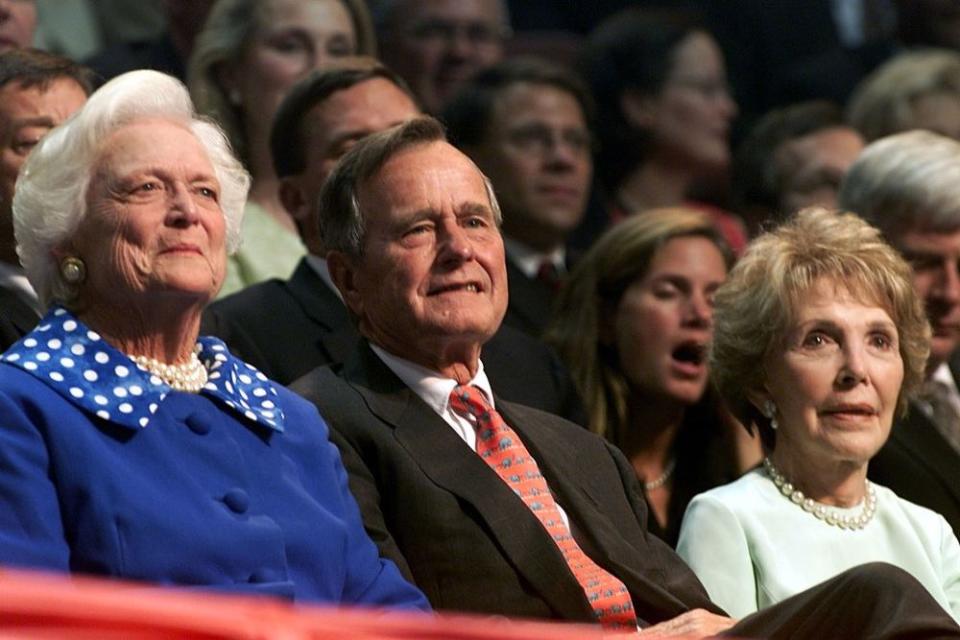
After Reagan gave a notably tepid endorsement of his vice president during Bush’s 1988 presidential campaign, Mrs. Bush wrote that she and her husband thought it was Mrs. Reagan’s doing, according to Page.
In a controversial and unauthorized biography of Mrs. Reagan in 1991, Kitty Kelley wrote that Mrs. Reagan “would not support Bush, and she did not want his campaign to dominate the final months of her husband’s presidency.”
According to Anthony, the historian, citing a Republican aide who knew both first ladies, Mrs. Bush hinted at her displeasure directly to Mrs. Reagan during a joint photo appearance for Reagan’s endorsement of his successor.
“You’ve never liked me and I’ve never liked you,” Mrs. Bush told Mrs. Reagan in 1988, according to Anthony. “After this, we don’t have to do anything together again.” Mrs. Reagan did not respond.
Even when their husbands no longer worked together, the two women kept tabs on one another.
“[Mrs. Bush] relished gossip about Nancy Reagan and expressed delight when told that the former First Lady loathed her,” Newsweek reported in 1992. “The feeling was mutual, Barbara Bush assured friends.”
According to Page, Mrs. Bush reportedly read Kelley’s headline-grabbing biography of Mrs. Reagan “with apparent relish, albeit with the cover masked.”
Years later, in Kelley’s subsequent book about the Bushes, she described how Mrs. Reagan “delighted in dishing the details of George Bush’s alleged marital infidelities,” Page wrote.
Mrs. Bush own memoir, published in 1994, does not speak ill of her predecessor. In Mrs. Reagan’s memoir, published five years earlier, Mrs. Bush is only mentioned briefly though with an almost passive-aggressive nod to her noted lack of airs.
Privately, according to Page, Mrs. Bush found Mrs. Reagan’s My Turn “a dreadful book.”
The feeling was surely mutual.
“Each managed to feel superior to, and also threatened by the other,” Page wrote.
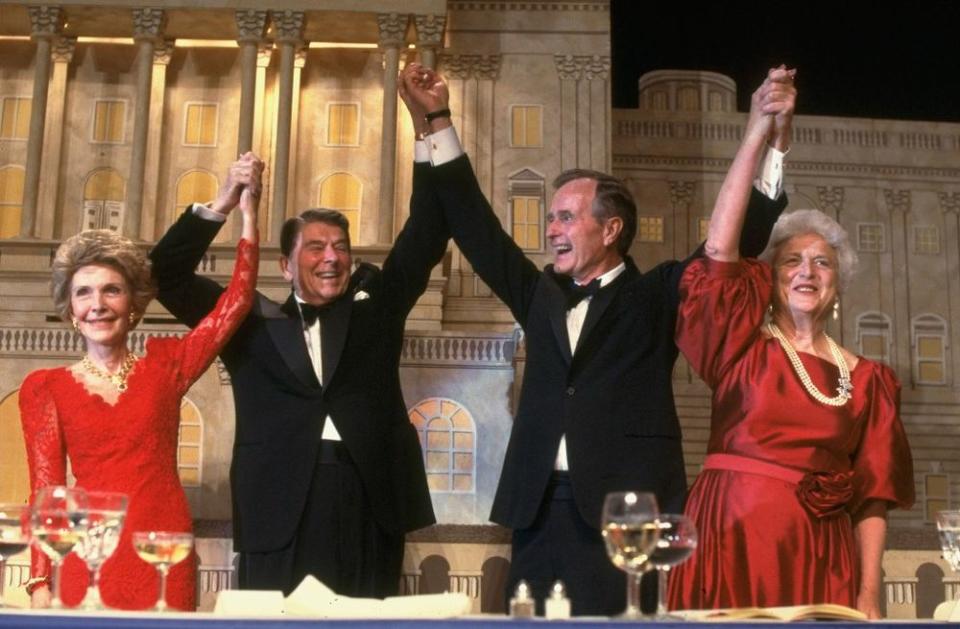
But Why?
In Page’s view, the two first ladies “were so alike, and so different.”
Mrs. Reagan could feel insecure around Mrs. Bush, who was “part of a New England aristocracy that dated its direct ancestry to the Mayflower,” according to Page.
But Mrs. Reagan felt she was afforded no such welcome to America’s highest ranks. “Nancy was always viewed as a social-climbing parvenu,” PEOPLE reported in 1990.
“I think Mrs. Reagan felt that Mrs. Bush got a much fairer shake, a more generous shake — less critique, less criticism,” said Mark Weinberg, a Reagan-era press aide, according to Page.
Mrs. Bush “got off the hook for things in a way that she never did. That bothered her a lot. Fundamentally, she just didn’t think that was fair. … She felt like, my God, if whatever I do is wrong, whatever she does is right,” Weinberg said.
Mrs. Reagan’s “appearance and style” might also have tweaked a lifelong insecurity that Mrs. Bush had grown up with, as the less-pleasing daughter of a mother who “put such a premium … on beautiful things,” Page wrote.
Conservative writer and longtime White House observer George Will believed it “was a class thing,” according to Page.
“Nancy was disdainful of Barbara for her sturdy figure, her matronly clothes, and her blunt manner,” Page wrote. (Some White House staffers told Page that Mrs. Bush could seem “imperious at times.”) For her part, “Barbara was disdainful of Nancy as brittle and shallow, and as a mother who had failed to forge a close or even functional relationship with her children.”
“I think she just was insecure,” Mrs. Bush told Page.
But their views on one another were hardly one-dimensional, according to Page.
She wrote: “Nancy … was envious of Barbara’s self-confidence, her social standing, and her close-knit family,” while the latter “admired Nancy’s slender figure, the grace with which she wore stylish fashions, and the open devotion she commanded from an adoring husband.”
It was not all unkindness between them.
According to Pamela Kilian’s 2003 biography, Mrs. Bush once remarked upon the isolation of living in the White House: “I think how awful it must be for Nancy Reagan not being able to walk around the lawn, having strangers wandering through the downstairs rooms all morning.”
In her ’94 memoir, she wrote, “Nancy Reagan got lots of criticism for redecorating the White House when we all should have been on our knees thanking her. She raised the money privately and not only redecorated but restored the White House, including modernizing the bathrooms and fixing faulty wiring. As her successor, I was eternally grateful to her for that.”
And after learning that Reagan had been shot in 1981 in an attempted assassination, Mrs. Bush wrote in her memoir, “My heart ached so for Nancy.”
But she recognized the distance between them: “I knew that the best thing I could do for her was to stay away; what she needed was a best friend.”
RELATED: The Assassin Next Door — John Hinckley Jr.’s ‘Symptom-Free’ Life Now
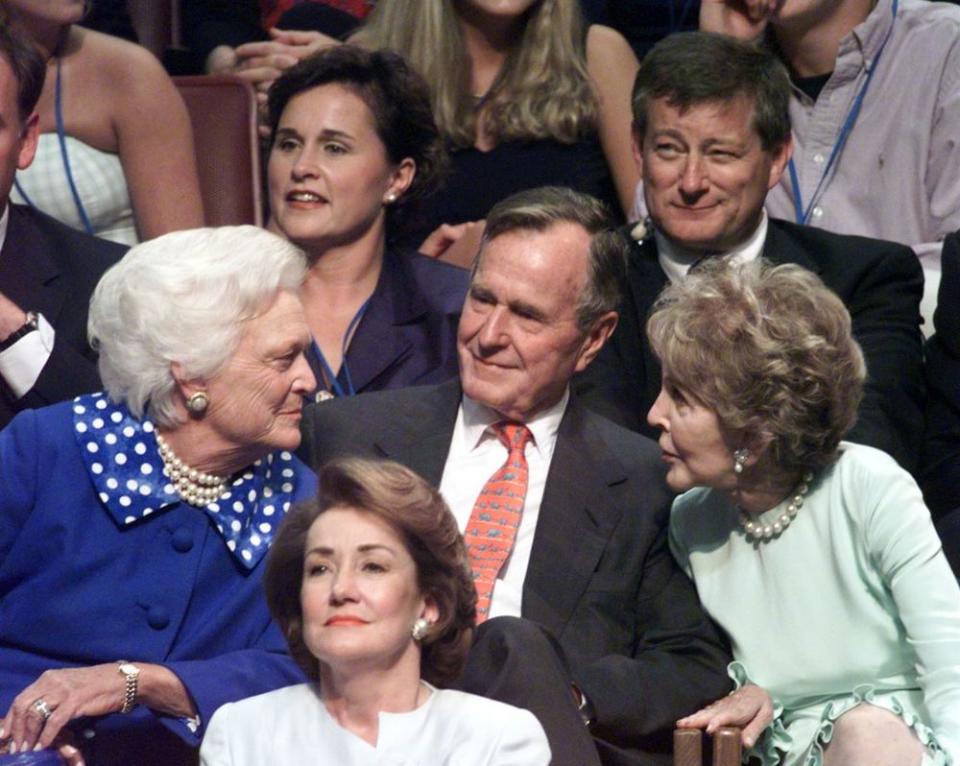
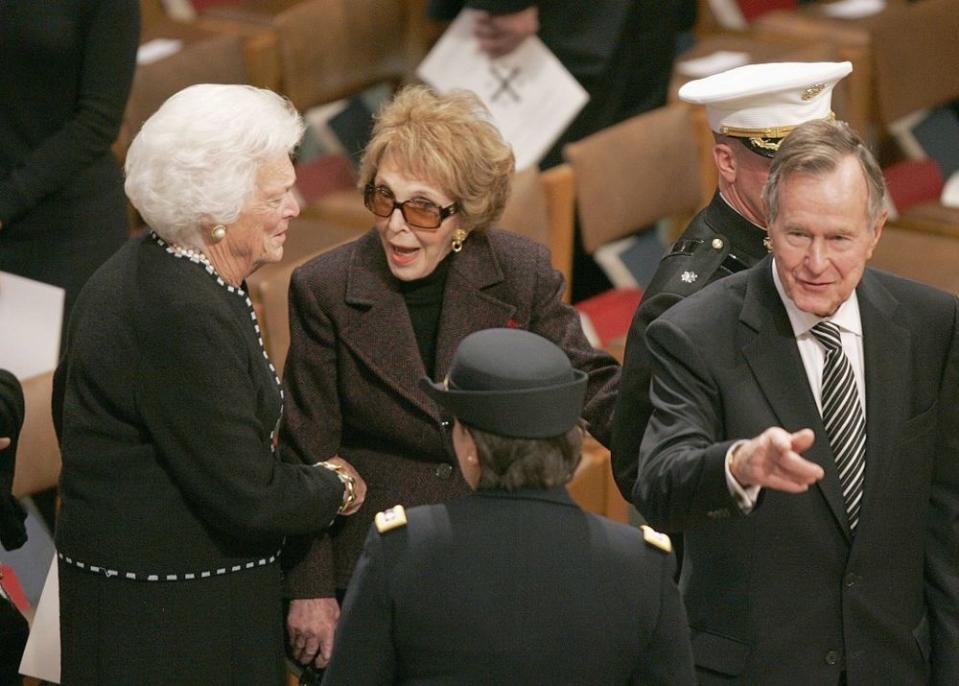
‘I Never Got to Know Her’
As two members of one of the most exclusive clubs in history, Mrs. Bush and Mrs. Reagan could not ever truly escape the other.
While, according to Page, they never had another lengthy conversation after their ’93 call, they regularly crossed paths at presidential functions and related political gatherings, including the 2000 Republican National Convention.
The Reagans returned to the White House for their official portraits while Bush was president and the atmosphere was “polite and formal, with tense smiles,” Anthony, the historian, wrote last year.
They saw each other “in passing” at Reagan’s 1994 funeral, according to Page, though Mrs. Reagan kissed Mrs. Bush on the cheek.
They both attended Lady Bird Johnson’s funeral, in 2007, according to Anthony. And they last saw each other at another funeral, for President Ford, several months later. Photos show they spent some time talking to one another.
Two years later, in Vanity Fair, Mrs. Reagan reflected on her life, her husband and the Bushes.
She was measured but succinct on her relationship with Mrs. Bush: “I never got to know her very well.”
“Our lives just took different tracks,” Mrs. Reagan said. “I was busy doing my thing with Just Say No and Foster Grandparents, and she was doing her thing. You go separate ways. People don’t realize that, but you do.”
Still, according to Vanity Fair, when Ron Reagan had attacked George W. Bush in Esquire, Mrs. Reagan called Mrs. Bush “personally to apologize.”
When Mrs. Reagan died in 2016, at 94, Mrs. Bush celebrated her long love for her husband.
“Nancy Reagan was totally devoted to President Reagan, and we take comfort that they will be reunited once more,” she said in a statement. “George and I send our prayers and condolences to her family.”
Speaking with Page in the months before her own death last year, at 92, Mrs. Bush had not entirely softened on the woman from whom she inherited the White House.
Referring to Mrs. Regan’s 30-year-old memoir, she said, “Poor Nancy. I mean, why would you write a book and say it’s My Turn?”
“Don’t ever write a blame book,” she said, noting, “I don’t have anyone to blame.”
Page told Mrs. Bush, “You held your tongue about any number of people in your book.”
To which she replied, “Good.”

